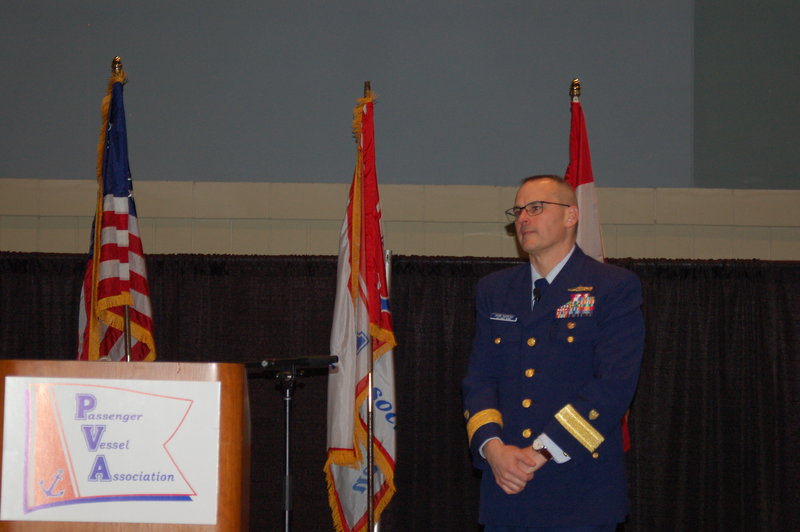Both the classification societies that inspect Jones Act vessels and the Coast Guard need to do a better job of finding problems or potential problems before signing off on a ship’s seaworthiness. That was the message delivered by Capt. Jason Neubauer of the Coast Guard's office of investigations and at the Passenger Vessel Association's Annual Convention in Savannah, Ga., this week.
“We’re going to change the way we hold third parties responsible,” Neubauer said. “ABS (American Bureau of Shipping) and the Coast Guard were not meeting up on the ship’s deficiencies.”
The final voyage of the 790' roll-on/roll-off containership El Faro has been well documented. The ship, which regularly sailed from Jacksonville, Fla., to San Juan, Puerto Rico, left the Florida port just as tropical storm Joaquin was gaining strength and growing into a hurricane. The El Faro’s captain, Michael Davidson, was locked into a particular weather forecast package that was as much as 12 hours old and told him he was south of the storm when the ship was actually north of Joaquin. As a result, he headed directly into the cyclone that would eventually send the ship, with 30 crewmembers aboard, to the ocean floor more than 15,000' below on Oct. 1, 2015.

Capt. Jason Neubauer led the Coast Guard's investigation into the sinking of the El Faro. Ken Hocke photo
Neubauer headed up the Coast Guard’s investigation of the El Faro sinking. Its report found that Capt. Davidson’s egotistical attitude and poor decision making contributed mightily to the disaster. In addition, the practice of using authorized classification societies to determine whether Jones Act vessels qualify for a loadline certificate needs revision.
Neubauer played two eerie tape recordings taken from the ship’s black box that have the captain unsuccessfully calling someone at Tote Maritime, which owned the El Faro at the time of the sinking, and a call to the Coast Guard whereby Davidson is frustrated by the operator’s unwillingness to get him the help he needs until he answers all of the questions the operator had been trained to ask.
The Coast Guard has been boarding Jones Act ships and finding a plethora of problems to the extent that a number of them have been taken out of service by their owners rather than pay for costly shipyard work to get them in compliance. Among those taken out of service was the El Faro’s sistership El Yunque. “All these deep-draft vessels look good on paper, but not when you go onboard,” Neubauer said. “A lot of these boats are supposed to go to North Korea [as part of the Military Sealift Command] if we need them in the future.”
Later in the day, part of Rear Adm. Paul Nadeau's address concerned the El Faro disaster. He said all the findings of the Coast Guard’s investigation have been put online. “It was important that we were as transparent as possible,” he said. “It was important to get this done.
Nadeau is scheduled to appear before Congress today concerning the El Faro sinking.
---
Stay updated on this story and more by subscribing to WorkBoat's free twice-weekly newsletters.



.JPG.small.400x400.jpg)

